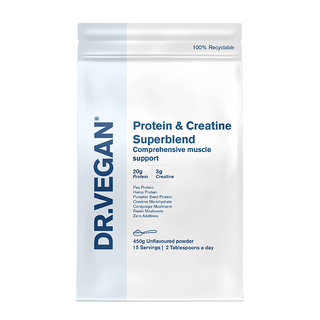What happens when you start taking creatine?

Whether you're hitting the gym or just looking to support your energy levels, creatine has become one of the most popular and well-researched supplements on the market. But what exactly happens when you start taking it - and is it right for you?
What is creatine?
Creatine is a natural substance found in your muscles and brain. It’s made from three amino acids - arginine, glycine, and methionine - and helps produce ATP, the main energy currency your body uses during physical and mental activity. Around 95% of creatine is stored in your muscles, but you also get small amounts from foods like red meat and fish. Creatine is not naturally found in plant-based foods, which means vegans and vegetarians typically have lower baseline creatine levels compared to meat-eaters. However, there are vegan-friendly sources of creatine however all of them come from supplementation.
Is creatine healthy and safe to take?
Yes, creatine is considered very safe for long-term use in healthy individuals. It’s one of the most studied supplements in the world, with hundreds of clinical trials showing positive effects on strength, energy, brain function and even muscle maintenance as we age.
It’s also not a steroid or hormone - it’s a naturally occurring compound your body makes and uses every day.
Benefits of creatine
- Increases strength and power (great for resistance training or HIIT)
- Enhances muscle energy and recovery
- May improve cognitive function, particularly in older adults or vegetarians
- Supports muscle preservation during ageing, menopause or calorie restriction
- May help with mood, fatigue and brain fog
Who is creatine for?
While commonly associated with athletes, creatine isn’t just for gym-goers:
What is the most common type of creatine supplement?
The most widely used form is creatine monohydrate. It’s affordable, effective and highly researched.
Other types include:
- Creatine hydrochloride (HCl) – may be easier on the stomach for some
- Creatine magnesium chelate – may reduce water retention
- Buffered creatine (e.g. Kre-Alkalyn®) – claimed to improve stability, but not well supported
For most people, creatine monohydrate is ideal.
What happens when you start taking creatine?
During the first few days: Your muscles begin to saturate with creatine, increasing energy output. Some people notice mild water retention in the muscles, which can feel like a quick size or weight increase.
Over 1–2 weeks, you may feel stronger, recover faster and have more stamina during workouts or daily activity. Cognitive improvements may appear more subtly - often noticed as better mental clarity or less fatigue.
How much creatine should I be taking?
The standard dose is 3 grams per day. Some people do a 'loading phase' (20 g/day for 5 days), but it’s optional. It’s best taken consistently (with or without food) and timing isn’t critical.
You can find 3g of creatine in the DR.VEGAN® Protein & Creatine Superblend. It also includes functional mushrooms that work in synergy with protein and creatine to support your performance, recovery and resilience. This trio is suitable for active individuals, vegans, older adults and anyone looking to enhance energy, focus and recovery — naturally and effectively.
Should I take creatine every day?
Yes. Daily use is key to keep muscle stores saturated. Even on rest days, your body uses creatine for cellular energy and recovery.
What happens when you stop taking creatine?
There are no withdrawal symptoms, but the benefits fade over time. You’ll gradually lose the extra stored creatine over 2–4 weeks. Your energy and performance may dip slightly, especially in high-intensity activity.
What are the side effects or risks of taking creatine?
For most healthy people, side effects are rare. However:
- Some may notice mild bloating or water retention
- Very high doses may cause digestive upset
- Kidney health is not affected in healthy individuals, despite outdated myths
Always follow dosing guidelines and speak with your healthcare provider if you have pre-existing kidney conditions.
Does creatine affect sleep?
There’s no evidence that creatine negatively affects sleep. In fact, some research suggests it might improve mental performance and fatigue, which can indirectly support better rest. That said, taking very high doses late in the day could potentially increase alertness in some individuals.
You may also enjoy reading:

















